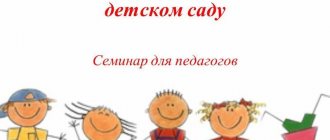MAGAZINE Preschooler.RF
The use of active forms of methodological work in preschool educational institutionsThe quality of education and its effectiveness is one of the pressing problems of domestic pedagogy. The leading role in ensuring the effectiveness of the educational process is played by the teacher and his professionalism.
Increasing the level of skill of teachers is a priority direction of the methodological work of MBDOU Semyansky kindergarten No. 7 “Snow White” . Methodological work occupies a special place in the management system of a preschool institution and represents an important link in the holistic system of advanced training of teaching staff, since, first of all, it helps to improve the professional competence of the teacher and the development of his creative initiative.
Activation of the creative activity of teachers is possible through interactive methods and forms of work with teachers. Many major methodological innovations are associated with the use of interactive teaching methods.
Interactive means the ability to interact or be in a conversation, dialogue mode with something (for example, a computer) or someone (for example, a person).
It is valuable that with such an organization of work, the teacher can not only express his opinion, view, give an assessment, but also, having heard the evidence-based arguments of his colleagues, abandon his point of view or significantly change it. Teachers develop respect for other people's opinions, the ability to listen to others, and make informed conclusions and conclusions.
Our educational institution practices the following forms of work with teachers:
- Pedagogical councils are permanent collegial bodies that consider various aspects of the activities of preschool educational institutions. Pedagogical councils are held throughout the year according to the annual work plan.
- Training seminars and workshops: “Development and enrichment of a child’s vocabulary. Preparing children for school” , “Development of speech in preschool children” , “Mastering the organization of project activities with children” . The focus of the workshop is not only on theoretical issues of the educational process, but also on practical skills.
- Master classes are a well-known form in the field of education of transferring experience and learning new things through the active activity of participants solving the task assigned to them. Professional experience was presented in conducting such master classes as “Organization of cognitive and research activities with preschoolers”, “Healthy baby!” , “Game stretching” , “Production of a teaching aid for sensory development” .
- Business games: “Correct answer” , “Use of health-saving educational technologies” , “Federal State Educational Standards experts” . During the business game, you can solve problems of varying complexity; it activates the creative initiative of teachers.
Also used are such forms of work as coaching sessions, quick-tuning, trainings, competitions, and round tables.
This experience helps develop creative potential and improve the professional level of colleagues, and is also an incentive to create new interesting projects.
| Next > |
Pedagogical sciences/2. Problems of specialist training
Ph.D. Gorbova O.V.
Humanitarian Institute of Northern (Arctic) Federal University named after. M.V. Lomonosov, Russia
Non-traditional forms of methodological work of preschool educational institutions
as a means of increasing
professional competence of educators
Improving the quality of education (preschool, primary, general, higher) is one of the pressing problems of modern society. The solution to this problem is associated with understanding the purpose of education, modernizing its content, optimizing technologies for organizing the educational process, and rethinking the result. The “Concept for the modernization of Russian education for the period up to 2010” outlines the goal of education, which involves the formation of certain competencies among consumers of educational services, and declares the introduction of a competency-based approach to educational institutions.
In Russian education, the category of “competence” began to be used since the 1990s; L.P. made a significant contribution to the development of this issue. Alekseeva, N.V. Kuzmina, A.K. Markova, L.M. Mitina, L.V. Petrovskaya, G.I. Sivkova, N.S. Shablykina and others.
Translated from Latin competentia
This is a range of issues in which a person is knowledgeable, has knowledge and experience. In the work of E.Yu. Rylova determined that the concept of “competence,” which is actively studied in Russian didactics, “... is the most capacious compared to the word “competence”, since it includes awareness ..., skill, skill, talent, and suitability” ( 1, p.55).
The competency-based approach is considered as an approach that orients the educational process towards the practicality of its results, in which a person’s ability to act in various problem situations is considered as a result, and the results of education are recognized as significant beyond the boundaries of education (2). In works devoted to the substantiation of the competency-based approach in education, it is emphasized that it has a fundamentally new character, different from the traditional (ZUN) approach.
In relation to preschool education, this is an approach in which the results of teachers’ professional activities will be manifested in children’s ability to make decisions and act in real life, i.e. apply your knowledge in practical activities. In relation to educators, the competency-based approach determines, first of all, the goals, motives, content of professional activity and leads to results that are significant outside of education, i.e. recognized by society.
From the position of I.A. Zimnyaya, competence is the internal, potential psychological new formations of the individual (knowledge, action programs, systems of values and relationships) and the ability of the individual to mobilize these new formations in professional activities; competence is an intellectually and personally determined social and professional life activity of a person, which is based on knowledge (3).
That is, competence is always an actual manifestation of competence in human behavior and activity, the ability to find the most effective way to solve a problem at minimal cost. Analysis of modern research allows us to identify a number of features of competence: integral characteristics, activity-based nature, personal attitude, creative decision based on the choice made.
In education, there are several types of competencies, including professional ones. V.N. Vvedensky defines professional competence as an integrative characteristic, including “professionalism”, “qualification”, “professional abilities” (4). S.A. Lisitsin and R.Kh. Gilmeev also define the integrative nature of this competence, including the ability of a specialist to solve professional problems and typical professional tasks that arise in the context of professional activity, using a body of knowledge, skills, professional and life experience, values, inclinations, etc.
In relation to the activities of a teacher, professional competence is considered as a certain set of personal characteristics that ensure the success of teaching activities due to a person’s readiness and ability to perform professional functions in accordance with the norms, standards, and requirements of society (L.V. Zanina, I.A. Kolesnikova, etc.) . From the point of view of M.I. Lukyanova professional and pedagogical competence is “a set of knowledge and skills that determine the effectiveness of work; scope of task skills; a combination of professionally significant personal qualities and properties; direction of professionalization; theoretical and practical readiness for work; ability to perform complex culturally appropriate types of actions; knowledge-based, intellectually and personally grounded experience of social and professional life” (4, p. 15). Based on the above, it can be determined that in the structure of professional pedagogical competence one can distinguish a personal component (the totality of knowledge, positions, attitudes, properties, characteristics of the subject of activity, which determines qualitative transformation) and an activity component, including the skills, experience and creative manifestations of the teacher , which determines the quantitative characteristics of professionalization. Moreover, both components, from the point of view of N.N. Nikitina constitute an individual style of activity based on professional orientation, pedagogical abilities, pedagogical technologies and techniques.
To date, a structural-functional model of professional competence of a preschool teacher has been developed, which includes motivational, theoretical, technological and performance readiness (5). At the same time, the significance of effective readiness lies in the formation of a holistic image of professional competence in the totality of all components, and professional development is considered as a process of developing the teacher’s subjectivity in the course of his education, which is constantly becoming more complex in terms of levels.
On the psychological and pedagogical features of the professional competence of preschool education teacher A.A. Mayer refers to “...objective requirements for the personality and activities of a specialist, recorded in state educational standards, certification and qualification documents” (6, P.10). Thus, the purpose of certification of teaching staff, which is defined by the “Regulations on the certification procedure...” (clause 1.2 and clause 1.3.), is to identify compliance of the level of professional competence with the qualification requirements when assigning qualification categories, and the most important task of the entire certification is to stimulate continuous improvement of the level professional competence (7, P.501). At the same time, according to the “Model Regulations on the Certification of Pedagogical and Managerial Workers...” (clause 3.3.), during certification it is necessary to take into account knowledge, the level of practical skills and abilities and evaluate the creative activity of the employee.
In the “Temporary requirements for assessing qualifications and the level of professional competence when assigning a qualification category... clause 3.3. requirements for qualifications, professionalism and productivity have been determined for each category, which are indicators of the level of professional competence of teachers. In this case, qualification is expressed in the degree, level of professional preparedness for any type of work. Professionalism is expressed in the implementation of the optimal selection of methods, means, forms of training and education; in the successful application of educational technologies or their elements; mastery and application of research and experimental methods of teaching and upbringing, methods of management and forecasting of the pedagogical process. Productivity involves creating conditions for the realization of creative abilities and the manifestation of children’s sustained interest in various types of activities; creative creation of an environment for the development of a child, based on a personality-oriented model of interaction, based on diagnostics of the level of intellectual and personal development of pupils on the basis of author's manuals and original teaching and upbringing tools.
Based on the literature studied, we can say that professional competence is a set of key (related to oneself, to social interaction), basic (related to the specifics of professional activity) and special (reflecting the specifics of a specific professional field of activity) competencies that should be formed by a preschool teacher. Formation of professional competence, according to L.V. Zanina (8), is carried out in three directions: changing the entire system of activity of the subject, its functions, hierarchical structure; change in the subject's personality; changing the relevant components of the subject’s attitude towards the object of activity (interest in it, awareness of its significance, knowledge of one’s real possibilities of influencing the object).
One of the means of forming and improving the professional competence of practicing teachers (along with passing certification, the current management system, teacher training in the professional development system, etc.) is methodological work, since this is part of the lifelong education system, one of the goals of which is to increase the level of general pedagogical and methodological preparedness of a specialist for organizing and implementing educational work in kindergarten (L.M. Volobueva).
Traditional forms of methodological work, in which the main place is occupied by the direct transfer of knowledge, are losing importance due to low efficiency and insufficient feedback. The modern education system, focused on a competency-based approach, requires the direct involvement of teachers in active cognitive activity using active and interactive methods and techniques for transmitting information, which is fully mastered, supported and subsequently used in direct practical activities. Analysis of works by K.Yu. Beloy, V.A. Derkunskaya, S.A. Lisitsina, G.K. Strelchenko et al. allows us to conclude that the methodological work of a preschool educational institution will be effective only if it meets the current needs of the teaching staff, is deeply motivated, is connected with the past and present experience of teachers, the participants are involved in the process and manage it themselves, and have the opportunity to immediately apply the acquired knowledge in real practice and achieve a specific result. The authors present individual interactive (non-traditional, innovative) forms aimed at increasing the competence of educators in various areas of preschool education and upbringing.
Interactive learning is a way of cognition carried out in the forms of joint activities of students, in which all participants in the educational process interact with each other, exchange information, jointly make decisions, simulate situations, evaluate the actions of colleagues and their own behavior, and are immersed in a real atmosphere of business cooperation on decisions pedagogical tasks and problems (9, p. 8). Interactive forms and methods of teaching include: discussion (method of dialogue, group discussion, analysis of practical situations, analysis of situations of moral choice, etc.); gaming (didactic and creative games, including business (management) games, role-playing and organizational activity games); training forms (communicative training, sensitivity training), which may include discussion and game teaching methods.
Active learning is a way of cognition when the student (educator) becomes the subject of educational activity, actively participates in the cognitive process, performing tasks of a creative and problematic nature (L.M. Volobueva). In the course of such training, a high level of teacher activity is ensured, horizons are expanded, skills and abilities of professional activity are formed, creative abilities and pedagogical reflection are developed, worldviews are formed, etc.
The development of professional competence of educators is possible with an active position towards personal and professional perfection. In the conditions of modern preschool education, the most effective means of increasing the professional competence of educators can and should be non-traditional forms of methodological work.
Literature
1. Rylova E.Yu. Towards identifying the essence of the concept of “pedagogical competence” // Bulletin of the Pomor University: Series “Physiological and psychological-pedagogical sciences”. – 2006. – No. 3. – P.55.
2. Andreev A.A. Competence-based paradigm in education: experience of philosophical and methodological analysis // Pedagogy. – 2005. – No. 4. – pp. 19-27.
3. Zimnyaya I.A. Key competencies as a result-target basis of a competency-based approach in education: Collection. – Arkhangelsk: AOIPK, 2005. – 12 p.
4. Vvedensky V.N. Modeling the professional competence of a teacher // Pedagogy. – 2003. – No. 10. – P.51-55.
5. Lukyanova M.I. Professional competence of a teacher: theoretical analysis of the concept // Preschool Education Management. – 2007. – No. 1. – P. 15-21.
6. Mayer A.A. Model of professional competence of a preschool teacher // Preschool Education Management. – 2007. – No. 1. – P. 8-14.
7. Handbook for kindergarten methodologist / Author-comp. N.Yu. Chestnova. – Rostov-on-Don: Phoenix, 2004. – 672 p.
8. Zanina L.V., Menshikova N.P. Fundamentals of pedagogical skills / Series “Textbooks and teaching aids”. – Rostov-on-Don: Phoenix, 2003. – 288 p.
9. Modern methods of enhancing learning / Ed. T.S. Panina. - M.: Publishing House, 2006. - 176 p.


